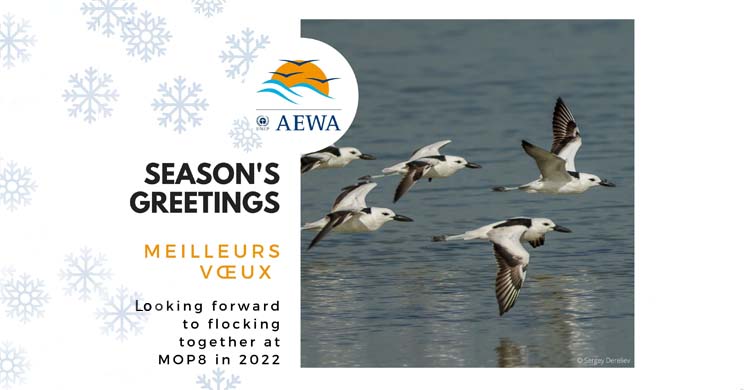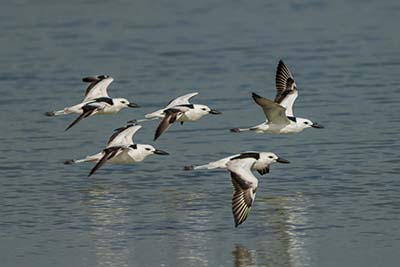2021 End of Year Message

AEWA Season's Greetings 2021
Dear friends of AEWA,
As 2021 draws to a close, I would like to take a moment to reflect on the past year and share some of its highlights for AEWA with you. 2021 will now be the second year in which the COVID-19 pandemic has held much of the world hostage. Globally, the pandemic has had a dramatic effect on life as we know it and my sincere condolences go to everyone who has suffered loss or has struggled in some form during this difficult period.
And yet, despite the continuing challenges caused by the pandemic, I am pleased to be able to report that AEWA – both as a treaty and network of dedicated countries, organizations and individuals has continued to operate effectively and that the Secretariat has continued to be able to play its role in ensuring that flyway cooperation and the work to conserve migratory waterbirds across borders continues.
Early in the year, the Secretariat organized the 16th Meeting of the AEWA Technical Committee (TC16) as a purely online meeting from 25 to 29 January 2021. The meeting was the most attended TC meeting in the history of the Agreement drawing together 61 participants from over 30 countries. 2021 also saw a record number of four AEWA Standing Committee Meetings being held in a given year and several other meetings and events also took place virtually.
The 1st Meeting of the AEWA Benguela Coastal Seabird International Working Group was organized by the Secretariat together with BirdLife South Africa and was held online on 3-4 March 2021. From 21 to 23 June 2021, the AEWA European Goose Management Platform (EGMP) held its 6th International Working Group Meeting (EGM IWG 6) remotely and was able to adopt several Adaptive Flyway Management Programmes (AFMP) - clearly a major highlight for the work being done under the platform this year. In addition, I would like to point you to a new Goose Management Webinar Series being organized in the framework of the AEWA European Goose Management Platform (EGMP) on a range of “goose and agriculture” topics and challenges many AEWA countries are facing in Europe.
Although the substantive work and pre-meeting document preparation was completed on time, the pandemic unfortunately did ultimately lead to the postponement of the 8th Session of the Meeting of the Parties to AEWA (MOP8). The AEWA governing body meeting was originally scheduled to take place 5-9 October in Budapest, Hungary in the margins of the “One with Nature” exhibition being held there. The decision to postpone AEWA MOP was made with regret by the AEWA Standing Committee (StC) after a thorough risk analysis and extensive consultation with Parties. I would like to once again thank all the StC members involved in the deliberations for their careful consideration and handling of this difficult decision. In this regard, I would particularly like to again express my sincere appreciation to the Government of Hungary and the dedicated team for all their efforts to try to make this important AEWA meeting happen despite all the challenges we faced.
I would also like to take a moment to mention a number of other exciting activities in which the Secretariat was involved, even if the main work was carried out by key AEWA partners. These include the recent Climate Change Adaptation for Migratory Waterbird Training for eligible African Parties organized by Wetlands International and the Lesser Flamingo satellite tracking training workshop at the Djoudj National Bird Park (PNOD) in Senegal. The RESSOURCE project lead by FAO also produced an impressive set of results which will be wrapped up next year.
The commitment and dedication of AEWA Parties and partners continues to be strong and I would like to express my sincere gratitude for all the work carried out on both the national and international level to implement the Agreement. Although there are many examples to choose from, I would personally like to highlight the work which was carried out on Madagascar Pond-heron conservation by ASITY Madagascar in spring 2021 thanks to small-scale funding from the UK the Secretariat was able to provide .
The Secretariat has also used this year to begin work on a number of EC funded projects, which will deliver a Training of Trainers course on flyway conservation for Small Island Developing States (SIDS) in Africa in 2022/2023. The project will also support national and regional implementation action for the conservation of the Slaty Egret and the Northern Bald Ibis.
I would like to emphasize the importance of awareness raising on both the national and international level and would like to thank all who have helped to make World Migratory Bird Day grow into one of the most widely and actively celebrated international days in the global environmental calendar. I am particularly proud of what we have been able to achieve together with the Convention on Migratory Species (CMS) and the US-based NGO Environment for the Americas (EFTA) over the years with this campaign and am looking forward to sharing further information with you about the 2022 World Migratory Bird Day theme focusing on the impact of light pollution next year.
The current crisis the world is facing has shown us how closely human, animal and environmental health are linked. However, it has also re-confirmed to me the importance of international cooperation and solidarity that is needed to tackle the global challenges of our time. However, this spirit of cooperation which is more urgently needed than ever is built on the kind of work we have diligently been doing over the years at AEWA.
I would also like to take a moment to sincerely thank the Secretariat team for all their hard work, dedication, trust and endurance in this difficult year. I would like to especially acknowledge and thank our dear colleague Nina Mikander, who left the Secretariat for a position at the Finnish Ministry of the Environment in February 2021 for all the amazing work she has done over the course of nearly 12 years she worked at AEWA.
As this year comes to a close, let us look forward to 2022 with resilience and hope and continue to build on what we have achieved so far as a community of like-minded nations and individuals, working collaboratively across borders for the benefit of waterbirds in the true spirit of international flyway conservation.
The recent update of the IUCN Red List published this month reveals that 7 waterbird species covered by AEWA have seen their classification improve, which is good news. However, the up-listing of the Maccoa Duck is a wake-up call to remind us that we must not give up on conserving our species and our ecosystems, which are the basis of our life on earth.
On behalf of the entire AEWA team, I would like to extend to you and to your families our very best wishes for a happy and healthy New Year.
I am looking forward to flocking together at MOP8 next year!
Dr. Jacques Trouvilliez
Executive Secretary

AEWA End of Year E-Newsletter 2021
Last updated on 21 December 2021


